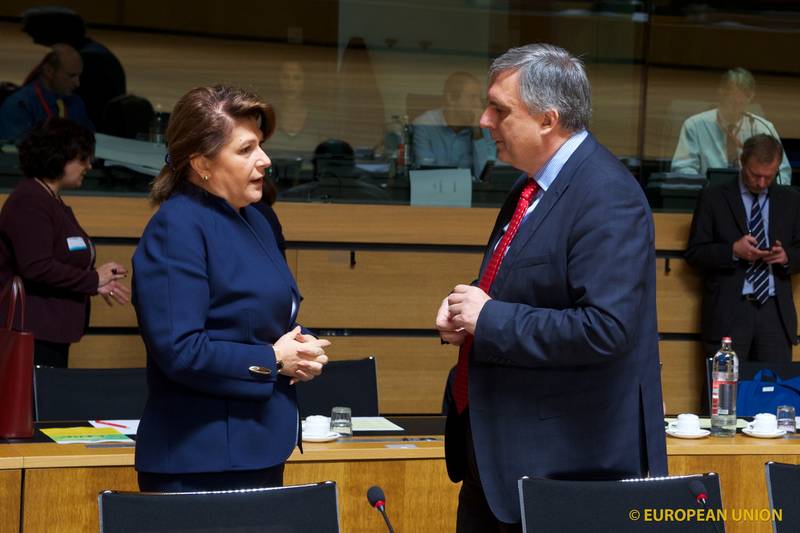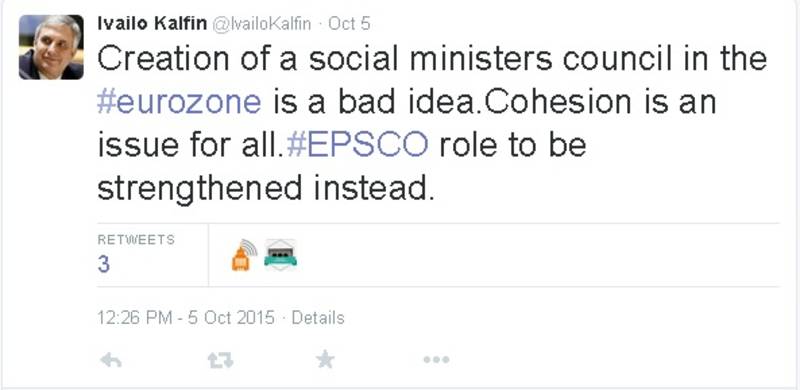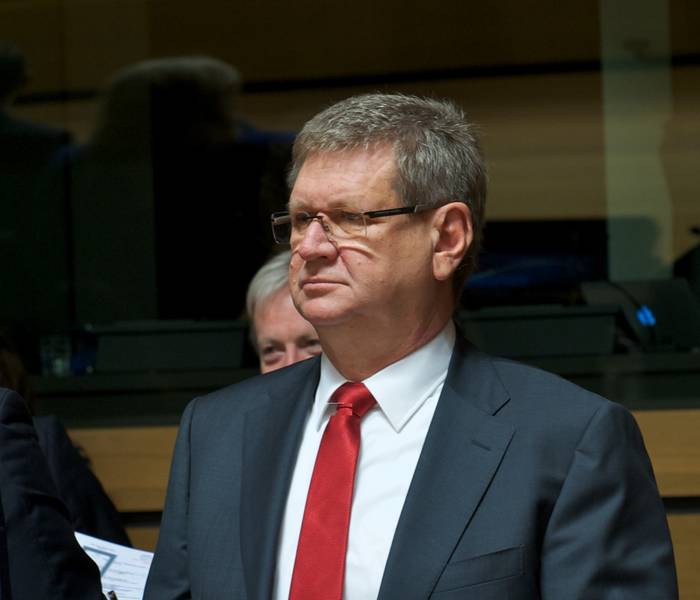The Five Presidents' Report Is Starting To Separate the Euro Area from the EU
Adelina Marini, October 9, 2015
 Only a couple of months ago it looked highly unlikely not only that there will be any significant steps towards deeper integration within the euro area, but also that hardly anyone were going to look into another vision about its future that is the five presidents’ report, presented officially at the end of June. At that time, at the peak of the Greek crisis and the more and more de-tabooed talk of a GRexit, the report fell in the epicentre of the “now is not the time” moods. The beginning of the autumn political season in the EU, however, turned the tables all the way. Not only is the report getting discussed a lot, and at high levels at that, but it is also being worked on, catching the states not sharing the common currency unprepared. A meeting was held in Luxembourg on October 5th in an unusual format. Before the regular meeting of the Employment, Social Policy, Health and Consumer Affairs (EPSCO) Council – not a very lucrative format for the Brussels journalist guild – there was a meeting of the Ministers of Labour of the euro area.
Only a couple of months ago it looked highly unlikely not only that there will be any significant steps towards deeper integration within the euro area, but also that hardly anyone were going to look into another vision about its future that is the five presidents’ report, presented officially at the end of June. At that time, at the peak of the Greek crisis and the more and more de-tabooed talk of a GRexit, the report fell in the epicentre of the “now is not the time” moods. The beginning of the autumn political season in the EU, however, turned the tables all the way. Not only is the report getting discussed a lot, and at high levels at that, but it is also being worked on, catching the states not sharing the common currency unprepared. A meeting was held in Luxembourg on October 5th in an unusual format. Before the regular meeting of the Employment, Social Policy, Health and Consumer Affairs (EPSCO) Council – not a very lucrative format for the Brussels journalist guild – there was a meeting of the Ministers of Labour of the euro area.
The meeting of the 19 social ministers happened for the first time in EU history on the initiative of the Luxembourg presidency. Its goal was to discuss the boosting of the social dimension of governance in the euro area, where social segregation, caused by the debt crisis, was growing instead of diminishing. Minister of Labour of Luxembourg Nicolas Schmit explained the decision to hold the meeting with the fact that the states in the Economic and Monetary Union are facing "specific common challenges" and “share the same interests and responsibilities". Without the social dimension the euro area is doomed, he said and proposed that the EPSCO Council becomes just as significant a player as the Eurogroup and the Economic and Financial Affairs Council (ECOFIN). Traditionally, every ECOFIN meeting is preceded by a meeting of the Eurogroup (Ministers of Economy and Finance of the euro area states). Nicolas Schmit believes that a similar thing should happen with the social ministers.
He referred to the five presidents’ report, where it talks about the need for good functioning of labour markets and social systems. To secure this, a deeper integration of national labour markets by facilitating geographic and professional mobility, including through better recognition of qualifications, easier access to public sector jobs for non-nationals and better coordination of social security systems is proposed.
During the social Eurogroup, the ministers discussed several issues, presented by the Luxembourg presidency, the first of which being whether they agree to this format becoming regular and reporting to the euro area summits that are agreed to convene at least twice a year. Another issue is how to formalise the convergence process, which is one of the major pillars in the report of the five presidents – of the EC, ECB, Eurogroup, European Council, and the EP. The third issue was how to ensure a connection with states outside the euro area. The last one turned out to be a much more important issue than the first two for sharp reactions to this unexpected and big step towards deeper euro area integration were not long in the coming.

Immediately after the meeting the Bulgarian Minister of Labour and Social Policy Ivailo Kalfin Tweeted his outrage in English: “Creation of a social ministers council in the eurozone is a bad idea. Cohesion is an issue for all. EPSCO role to be strengthened instead”. There was a criticising reaction from his Croatian colleague Mirando Mrsić as well, who stated after the Monday meeting: “To us the EU means a community and we are concerned by the situation that purposefully separates Europe in two parts, which conducting such a meeting right before the EPSCO undoubtedly is. The policies we are responsible for are important to us all and we have to work on them together”.
Minister of Social Security of Luxembourg Romain Schneider ensured that states outside the euro area would not be isolated. Nicolas Schmit was adamant that if the meetings in Eurogroup-format do continue to happen they would not be a decision-making body, same as the Eurogroup. The main body remains the Council of the 28, he added. This is not strictly true. The role of the Eurogroup is set in Protocol #14 to the Treaty of Lisbon. Because of the necessity for better coordination of economic policies of the euro area member states, the protocol states that meetings in the “Eurogroup” format will be informal. Issues regarding the common currency will be discussed at these meetings in the presence of representatives from the EC. Representatives from the ECB will also be invited.
The Eurogroup can elect a President. His/her term in office is two and a half years. At the moment Dutch Minister of Finance Jeroen Dijsselbloem is in his second term of leading the Eurogroup. And if the meetings are to be truly informal in their nature, meaning no concrete decisions are made, this certainly is not what happened in the Greek case. The Eurogroup played a key role in the Greek bailout programme. So much so, that heads of states and governments of member countries declared repeatedly that the fate of the programme is being decided by the Eurogroup. In the protocol for this format it is implicitly stated that it is about coordination of euro area economic policy.
Legal experts from the Council and the EC will have to come up with a position whether social policies are part of economic policy or are they separate, for if they are completely independent and equal then the social Eurogroup will have to receive adequate formalisation with a separate Protocol or other legal decision. Having in mind the already existing resistance this will prove rather difficult. It becomes clear from statements made at the meeting that the Luxembourg presidency is firmly set on fighting for a social Eurogroup to the end. Minister Nicolas Schmit stated that there is a very strong and hostile pressure against the EU and the euro. The common currency is perceived solely as an instrument for budget discipline. “Yet, if this message [that the real goals are growth, employment and social protection] is not transmitted and the European project is not supported by its citizens, the EU will have setbacks”, said the minister.
The social dimension of the EU is quite a weak link in developing policies for dealing with the euro area debt crisis, regardless of the fact that it has been receiving more and more attention over the last few years. Alas it is mainly just talk. Despite talking about it, social protection remains chiefly a national cause, as euinside reported two years ago. EC boss Jean-Claude Juncker, however, announced achieving “a social triple A [rating]” for Europe as a major priority during his five-year term (by the year 2019). One of the ways of achieving that is developing a “European pillar of social rights”. At the moment, the EC is preparing a package  on labour mobility that will be presented by the end of the year. It was a major subject at the meeting of the College (Commissioners) that was held in Strasbourg.
on labour mobility that will be presented by the end of the year. It was a major subject at the meeting of the College (Commissioners) that was held in Strasbourg.
According to the EC Vice-President in charge of the euro, Valdis Dombrovskis, the crisis had an impact not only on economic growth, but it deepened social divergences as well. As a result, the resistance against free movement started to grow exponentially, regardless of its obvious benefits. The package on labour mobility will include measures for improvement of coordination with regard to social security and a review of the posting of workers directive. The future of the euro area as seen through the five presidents’ report will be one of the subjects on the agenda of the October European Council on the 15th and 16 of October in Brussels.
Translated by Stanimir Stoev
 Angela Merkel, Emmanuel Macron | © Council of the EU
Angela Merkel, Emmanuel Macron | © Council of the EU Benoit Coeure | © Council of the EU
Benoit Coeure | © Council of the EU Pierre Moscovici | © Council of the EU
Pierre Moscovici | © Council of the EU